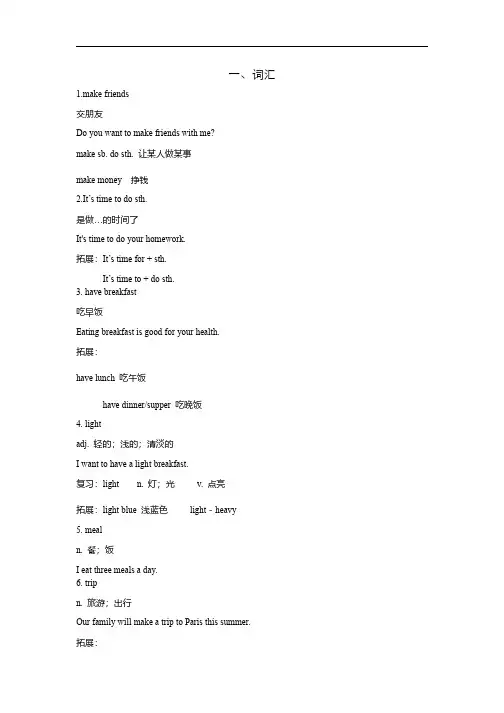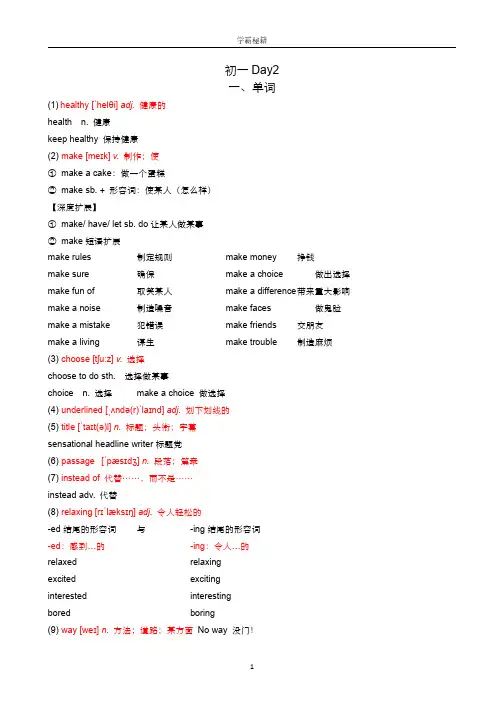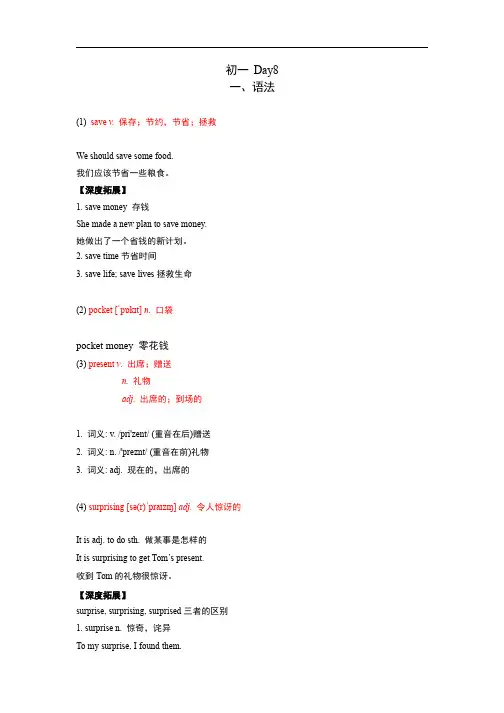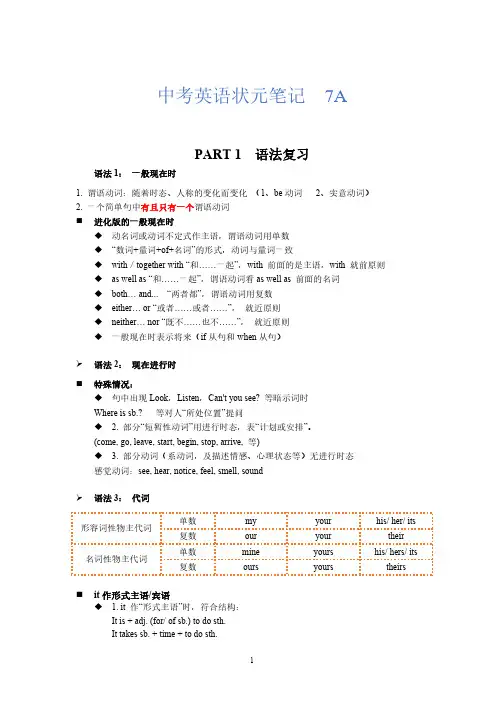中考状员学习笔记(英语)
中考状元学霸笔记3

一、词汇1.make friends交朋友Do you want to make friends with me?make sb.do sth.让某人做某事make money挣钱2.It’s time to do sth.是做…的时间了It's time to do your homework.拓展:It’s time for+sth.It’s time to+do sth.3.have breakfast吃早饭Eating breakfast is good for your health.拓展:have lunch吃午饭have dinner/supper吃晚饭4.lightadj.轻的;浅的;清淡的I want to have a light breakfast.复习:light n.灯;光v.点亮拓展:light blue浅蓝色light-heavy5.mealn.餐;饭I eat three meals a day.6.tripn.旅游;出行Our family will make a trip to Paris this summer.拓展:make a trip to…去…旅行travel to…去…旅行7.differentadj.不同的I have different pencils.拓展:difference不同点be different from…与…不同the same as与…相同8.earthn.地球;泥土;陆地The earth is our home.拓展:on the earth在地球上on earth究竟9.difficultadj.困难的This question is difficult.拓展:difficulty n.困难easy简单的hard困难的10.keepv.保持;保存;坚持It’s important to keep healthy.拓展:keep the book保存书keep a pet养宠物keep running坚持跑步11.旅游;出行落实②different不同的地球;泥土;陆地earthdifficult困难的keep保持;保存;坚持11.simplyadv.简单地;仅仅She is simply a little girl.拓展:simple adj.简单的12.cornern.拐角;角落It is standing in the corner. 13.freeadj.免费的;自由的;空闲的I am free like a bird now.buy one get one free买一送一拓展:freedom n.自由14.be popular with受…的欢迎Jay Chou is popular with Chinese.15.solvesolve the problemv.解决;解答I want to solve all your problems.简单地;仅仅落实③corner角落免费的;自由的;空闲的freebe popular with受…的欢迎solve解决16.realizev.意识到;实现My mother realized her mistake.拓展:realize my dream实现我的梦想17.reviewv.复习n.复习;评论It’s time to review my lessons.17.review【re-前缀再一次】rewrite重写respell重拼recycle循环return返回18.pointv.指,点n.得分;要点You didn't get my point.拓展:point out指出19.mentionv./n.提到;说起Don't mention it.谐音:门神—过春节时我们会“提及“各种神仙,20.discussv.商量;讨论Let's discuss it.拓展:discuss=talk aboutdiscussion n.讨论20.discussdiscussion n.讨论二、语法连词板块的重点在于常考连词的意思和连词前后的逻辑关系1.and和;并且。
中考状元学霸笔记2

初一Day2一、单词(1)healthy[ˈhelθi]adj.健康的health n.健康keep healthy保持健康(2)make[meɪk]v.制作;使①make a cake:做一个蛋糕②make sb.+形容词:使某人(怎么样)【深度扩展】①make/have/let sb.do让某人做某事②make短语扩展make rules制定规则make money挣钱make sure确保make a choice做出选择make fun of取笑某人make a difference带来重大影响make a noise制造噪音make faces做鬼脸make a mistake犯错误make friends交朋友make a living谋生make trouble制造麻烦(3)choose[tʃuːz]v.选择choose to do sth.选择做某事choice n.选择make a choice做选择(4)underlined[ˌʌndə(r)ˈlaɪnd]adj.划下划线的(5)title[ˈtaɪt(ə)l]n.标题;头衔;字幕sensational headline writer标题党(6)passage[ˈpæsɪdʒ]n.段落;篇章(7)instead of代替……,而不是……instead adv.代替(8)relaxing[rɪˈlæksɪŋ]adj.令人轻松的-ed结尾的形容词与-ing结尾的形容词-ed:感到…的-ing:令人…的relaxed relaxingexcited excitinginterested interestingbored boring(9)way[weɪ]n.方法;道路;某方面No way没门!the way to…到…的路by the way顺便说一下【作文拓展】in this way用这种方法It’s a good way to do…这是一个做…的好方法1.这是一个保持健康的好方法。
中考状元学霸笔记8

初一Day8一、语法(1)save v.保存;节约,节省;拯救We should save some food.我们应该节省一些粮食。
【深度拓展】1.save money存钱She made a new plan to save money.她做出了一个省钱的新计划。
2.save time节省时间3.save life;save lives拯救生命(2)pocket[ˈpɒkɪt]n.口袋pocket money零花钱(3)present v.出席;赠送n.礼物adj.出席的;到场的1.词义:v./pri'zent/(重音在后)赠送2.词义:n./'preznt/(重音在前)礼物3.词义:adj.现在的,出席的(4)surprising[sə(r)ˈpraɪzɪŋ]adj.令人惊讶的It is adj.to do sth.做某事是怎样的It is surprising to get Tom’s present.收到Tom的礼物很惊讶。
【深度拓展】surprise,surprising,surprised三者的区别1.surprise n.惊奇,诧异To my surprise,I found them.令我惊讶的是,我找到了他们。
2.surprising adj.令人惊讶的This is not surprising.这并不足为奇。
3.surprised adj.感到惊讶的I was surprised at the news.我对这消息感到惊讶。
(5)happen[ˈhæpən]v.发生happen to sb.发生在......身上This accident could happen to any of us.这种事故可能发生在我们任何人身上。
(6)come up to靠近【深度拓展】易错点:come up with an idea想出一个主意(7)pay for支付1.pay钱for物I need to pay400yuan for the present.我需要付给夏令营400元。
中考复习:中考英语状元笔记-重点语法词法梳理

中考英语状元笔记7APART1语法复习语法1:一般现在时1.谓语动词:随着时态、人称的变化而变化(1、be动词2、实意动词)2.一个简单句中有且只有一个谓语动词⏹进化版的一般现在时◆动名词或动词不定式作主语,谓语动词用单数◆“数词+量词+of+名词”的形式,动词与量词一致◆with/together with“和……一起”,with前面的是主语,with就前原则◆as well as“和……一起”,谓语动词看as well as前面的名词◆both…and...“两者都”,谓语动词用复数◆either…or“或者……或者……”,就近原则◆neither…nor“既不……也不……”,就近原则◆一般现在时表示将来(if从句和when从句)语法2:现在进行时⏹特殊情况:◆句中出现Look,Listen,Can't you see?等暗示词时Where is sb.?等对人“所处位置”提问◆ 2.部分“短暂性动词”用进行时态,表“计划或安排”。
(come,go,leave,start,begin,stop,arrive,等)◆ 3.部分动词(系动词,及描述情感、心理状态等)无进行时态感觉动词:see,hear,notice,feel,smell,sound语法3:代词形容词性物主代词单数my your his/her/its 复数our your their名词性物主代词单数mine yours his/hers/its 复数ours yours theirs⏹it作形式主语/宾语◆ 1.it作“形式主语”时,符合结构:It is+adj.(for/of sb.)to do sth.It takes sb.+time+to do sth.◆ 2.it作“形式宾语”时,符合结构:sb.find it+adj.to do sth.语法4:特殊疑问词1.疑问代词:l指人:who, whoml指物:whatl既可指人又可指物:which, whose2.疑问副词:when, where, how, why3.特殊疑问词作主语,不确定数量时,谓语动词用单数How about=What about...怎么样...?How often多久一次(询问频率)回答:four times a year;always...How soon还有多久(短期)回答:in+一段时间How many/much多少(可数名词/不可数名词)How long多长时间回答:(for)+一段时间How far距离多远回答:ten miles/3kilometers(具体的距离)ten minutes’walk/five minutes’by bus语法5:名词⏹可数名词---复合名词复数变化两个名词构成:boy friends;paper bags(前不变后变)◆man或woman修饰:women doctors,men waiters(涉及到man/woman来修饰名词,需要两个名词同时变复数)⏹2、名词---修饰词◆只修饰单数名词---冠词:an/a;the◆只修饰复数名词—修饰词:few,a few/many,several/a great number of◆只修饰不可数名词:little,a little,much,a great amount of注:可同时修饰可数名词&不可数名词:some,any,a lot of=lots of,more,most,enough,plenty ofPART2词法复习1.形容词&副词✓ 1.系表结构(be+adj.\感官动词+adj.)感官动词:look,hear,smell,taste,feel✓ 2.频率副词:always,often,sometimes,seldom,hardly,never 2.[辨析]wear,put on,in,dress和have on✓wear意为“穿,戴”,强调状态。
- 1、下载文档前请自行甄别文档内容的完整性,平台不提供额外的编辑、内容补充、找答案等附加服务。
- 2、"仅部分预览"的文档,不可在线预览部分如存在完整性等问题,可反馈申请退款(可完整预览的文档不适用该条件!)。
- 3、如文档侵犯您的权益,请联系客服反馈,我们会尽快为您处理(人工客服工作时间:9:00-18:30)。
中考状元笔记
英语
初中学霸提升成绩的 16 个习惯
1、记忆习惯。
一分钟记忆,把记忆和时间联系起来,这里还含有注意的习惯。
一分钟写多少字,读多少字,记多少字,时间明确的时候,注意力一定好。
把学习任务和时间联系起来,通过一分钟注意、记忆来培养学习习惯。
2、演讲习惯。
让自己会整理、表达自己的思想,演讲是现代人应该具有的能力。
3、读的习惯。
读中外名著或伟人传记,与高层次的思想对话,每天读一、两分钟,与大师为伍,很多教育尽在不言中,一旦形成习惯,自己会终生受益。
4、写的习惯。
写日记,有话则长,无话则短,通过日记可以看出一个人有没有能力,有没有思想,有没有一以贯之的品质。
5、定计划的习惯。
凡事预则利、不预则废。
后进生毛病都出在计划性不强,让人家推着走,而优秀的自己长处就在于明白自己想要干什么。
6、预习习惯。
让自己学进去,感受学习、探索、增长能力的快乐。
所以请各位同学一定要培养自己预习的习惯。
7、适应老师的习惯。
自己同时面对各学科教师,长短不齐、在所难免。
自己要适应老师,与老师共同进步,不要稍不如意就埋怨环境。
8、大事做不来,小事赶快做的习惯。
这也是非常要紧的一个习惯。
尖子自己做尖子的事,后进自己别盲目攀比。
大的目标够不到,赶快定小的目标。
难题做不了,挑适合你的容易做的题去做。
人生最可怕的就是大事做不来,小事不肯做,高不能成,低不肯就,上得去、下不来。
所以要让我们的自己永不言败。
9、自己留作业的习惯。
老师留的作业不一定同时适应所有同学。
同学们要让自己做到脚踏实地、学有所得,从自己的实际出发,为自己布置作业。
10、错题集的习惯。
每次考试之后,90 多分的、50 多分的、30 多分的同学,如何整理错题?扔掉的分数就不要了,这次30 分,下次40 分,这就是伟大的成绩。
找到可以接受的类型题、同等程度的知识点研究一下提高的办法。
整理错题集是很多同学公认的好习惯。
11、出考试题的习惯。
自己应该觉得考试不神秘。
高中自己应该会出高考试题,初中自己会出中考试题。
12、筛选资料、总结的习惯。
自己要会根据自己实际,选择学习资料。
十二个习惯,不要求齐头并进,每个同学要有自己的特点,让老师以教书为乐,让自己以学习为快乐。
这快乐要建立在养成这些良好习惯的基础上。
祝大家更多地享受到学习的快乐!。
